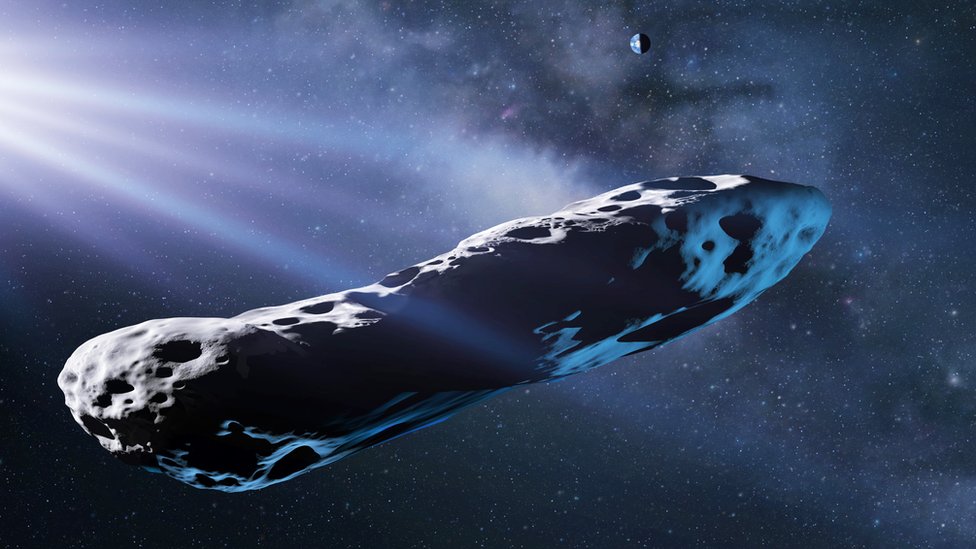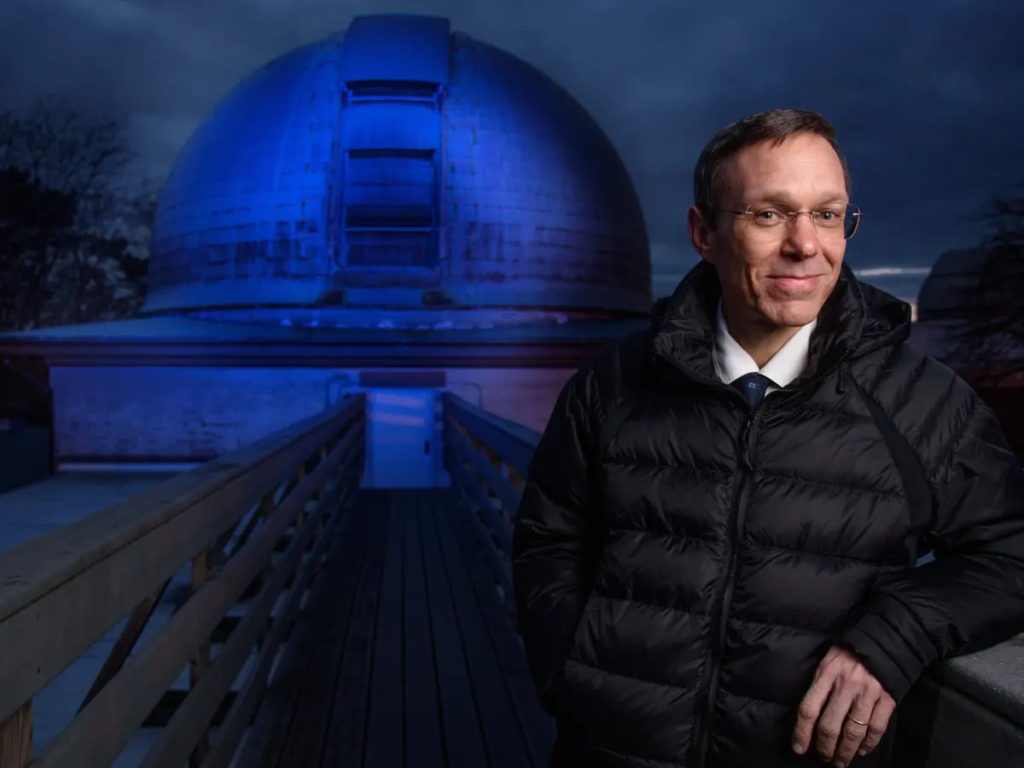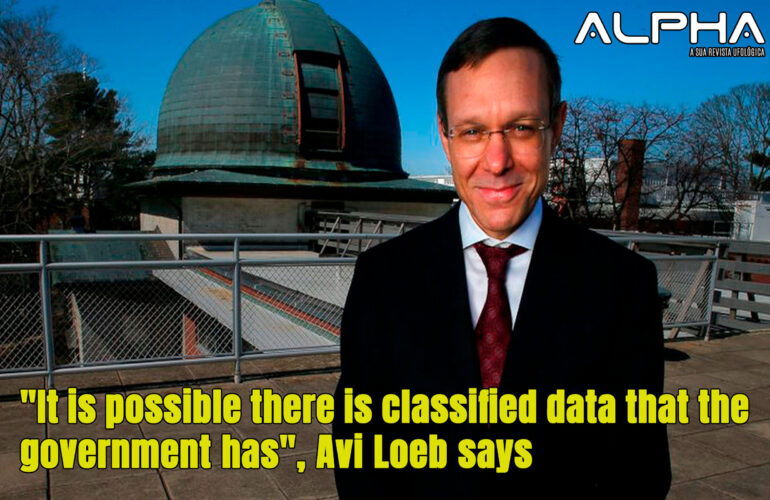THE INTERVIEWEE
Abraham ‘Avi’ Loeb was born in Israel, in 1962. He has served as the Frank B. Baird, Jr. Professor of Science at Harvard University since July, 2012, and has published more than 700 articles and essays. Loeb is also the founder of the Galileo Project, a widely recognized scientific research project with a focus on extraterrestrial intelligence.
More info about Professor Loeb can be found on his professional website: https://astronomy.fas.harvard.edu/people/avi-loeb
THE INTERVIEWERS
Revista Alpha (Alpha Magazine, in English) is one of Brazil’s most prominent magazines in the field of Ufology. Founded in 2014, it has featured several interviews and articles from researchers from all over the world, and is expected to expand its reach in upcoming years with the lead of Rafael Silva Pereira (founder, editor-in-chief) and Renan Schwingel (co-editor).
More info about the Alpha Magazine can be found on our website: http://revistaalphaufologia.com.br/
THE INTERVIEW
Rafael Silva Pereira: How did your interest in Astronomy and the cosmos begin?
Avi Loeb: I was interested in Philosophy at a young age, and the circumstances brought me to Astrophysics. I realized, after about twenty years or so, that I ‘married my two loves’, because there are philosophical questions in Astrophysics that we can use the scientific method to answer. Some of them are ‘are we alone?’, ‘is there another civilization like ours or more advanced than ours in our cosmic neighborhood?’, ‘what can we learn from them?’. Other questions are ‘how did the universe start?’, ‘how did we come to exist?’, ‘when did life start in the universe, and how did it evolve not just on Earth, but everywhere else?’ Altogether, I am very happy at what I am doing right now, because I can address those general questions using the scientific method.
Rafael Silva Pereira: Your book, “Extraterrestrial: The First Sign of Intelligent Life Beyond Earth”, is well-known in Brazil. What led you to understand that Oumuamua could be potential evidence of alien technology?
Avi Loeb: Well, it was an object that did not look like the rocks we had seen before in the solar system. This was the first Near-Earth object identified as too fast to be bound to the Sun. It was found by a telescope in Hawaii called Pan-STARRS, which was tasked to find Near-Earth objects. At first, they did not know it was interstellar in origin, but then they realized it, based on its motion, and reported it. For me, it was a surprise, because I wrote a paper one decade earlier forecasting no detection by this telescope. Based on what we know about the solar system, there should not be a large population of rocks in interstellar space, but yet they found it. As data came in, it became clear it was unusual, it was changing its bightness as a result of reflecting sunlight. It is not typical of a rock to be flat and also change the area that it shows us in the sky by a factor of ten as it is tumbling. Most interestingly, it was pushed away from the sun by some mysterious force and it was not as a result of the evaporation of ice on the surface, like you find in comets, because there was no comet around it. I suggest it is just the reflection of sunlight that is pushing it, and for that, the object had to be very thin, most likely artificial, because nature does not make thin objects like that – the size of a football field. About three years later, there was another object discovered by the same telescope in Hawaii that was pushed away from the sun by reflecting sunlight. That one was recognized as a rocket buster that was launched by Nasa in 1966. We know it was artificial, because we produced it. The question is: who launched Oumuamua?. Since then, we discovered two other interstellar objects, they were meteors that collided with Earth, roughly one meter in size. Very unusual, because they were tougher than all the space rocks. The material strength was tougher than iron and, based on where they disintegrated in the Earth atmospehere – very low and moving really fast – we discovered them with my student, Amir Siraj, and we are going on an expedition to figure out what they are made of, in a couple of months. We will try to scoop the fragments of the first interstellar meteor, from 2014, which is in the Pacific Ocean. It is challenging, but we want to see if it is made of some artificial alloy that characterizes spacecraft or if it is some unusual rock that came from a source that is very different from the solar system.

Renan Schwingel: The possibility of extraterrestrial intelligence is often discredited by some people within the scientific community. Do you feel there has been some change in their perspective on it?
Avi Loeb: Yes, I am trying to bring it to the mainstream of Astronomy. That is a profession where people supposed to be looking at the sky without prejudice, because we know that hundreads of years ago, people used to think we were the center of the universe. Since Galileo and Copernicus, we know that we are not at the center of the universe, the Earth moves arounds the sun, the sun moves around the galaxy and the galaxy is one out of a trillion galaxies in the universe. We also know that we came late – the human species is only a few million years old. If you come late to play the cosmic play, and you are not at the center of the stage, the play is not about you. That is what my colleagues have a problem realizing: they consider the existence of something like us out there as ‘extraordinary’. They say we need extraordinary evidence before we believe or discuss it. I say it is exactly the opposite: it would be extraordinary if we are the only ones, if we are the smartest. If we do not search, we will never find anything. The point is that extraordinary evidence requires extraordinary funding. You need to search, and that costs money. If you look at other areas, for example, we are searching for most of the matter in the universe – dark matter – and the scientific community puts billions of dollars in the search. The most recent aspect of that was the Large Hadron Collider, which smashed very energetic particles against each other and did not find evidence for dark matter there. If we are investing billions of dollars in the search and not finding what we are hoping to find, it is completely legitimate to look for objects in the sky that represent others like us. We sent five probes to interestellar space, we know that there are tens of billions of stars like the sun in the Milky Way galaxy alone. Most of these stars formed before the sun, and if we use spacecraft like the ones we sent out, it takes less than a billion years to traverse the entire Milky Way galaxy. They had a lot of time for their probes to reach us, and we also know most of these sun-like stars have planets and somewhere between have a planet the size of the Earth. What we find around us is not unique or special, therefore we should assume that there were other cultures before us. Now they may be dead because their star evolved by now, so you would not hear a radio signal from them just like you would not get a phone call from someone who is not active. But there is another approach which is to search your mailbox for packages that arrived in the mail: the sender may be dead by now, but you can still find the packages. Here I mean objects that are technologically manufactured that you could find near-Earth. I am leading the Galileo Project, which has this goal of looking for extraterrestrial technological equipment that may have arrived near-Earth from other civilizations.

Renan Schwingel: The UFO phenomenon has been more actively discussed in recent weeks, both in television shows and social media. What is your current take on the origin of these objects?
Avi Loeb: There was a report from the Director of National Intelligence to Congress, just a couple of months ago, that talked about hundreds of events that involved objects whose nature is nuclear in the sky, and they were reported by military personnel. Out of those, about half are likely to be balloons and, a small fraction, to be drones. In fact, the US shot down objects that looked like balloons last month. But then, the question is: from the point of view of science, is there even a single object that might be from extraterrestrial origin?. Because you do not need more than one, and that would change the future of humanity if we find out. Of course, the government is interested in this for a completely different reason: they want to protect the nation and the safety of military personnel, so they need to know what most of the objects are. I do not care about anything made in China, human-made – that is of no interest for me as a scientist. In the Galileo Project, that I lead, we built an observatory that monitors the sky 24/7 and collects data in the infrared, in the optical band, in the radio and audio, and we analyze it with artificial intelligence algoryithms to classify objects, and there are two general classes. One is natural objects, like birds, bugs, rocky meteors and then there are human-made objects, like balloons, drones, airplanes, rockets. Is there anything else? We do not know yet, because we just have the first observatory starting its operation, we are testing it. But in the future, we will make copies of it, place them in many locations, and hope to get a lot of data that will help us figure out wether there is something unusual in the sky.
Renan Schwingel: A paper recently written by you with Professor Kirkpatrick, mentions it is important that UFO investigation uses our current understanding of Physics. How can the use of scientific concepts make it easier to have a deeper view on what is going on?
Avi Loeb: The idea was that we have a lot of data that is consistent with Physics as we know it. All the gadgets we use on a daily basis – cell phones, GPS, computers – work extremely well, because we understand the Physics underlying their operation. A lot of people just do not appreciate that we have a huge amount of data that shows us that Physics works. It is not a matter of belief: every time we check it, it works. About UAP, there is data that is incomplete: very often, the images are blurry, or you get estimates from one point of view that is not reliable. There is no such data that demonstrates, beyond the reasonable doubt, that new physics is needed. It there was such data, that person would get a Nobel Prize. Altogether, the standard Physics predicts some signatures of objects if they behave in ways that are unusual, therefore, the first assumption is to assume that the Physics that we know works and we can put constraints. But if you do very good measuraments, I am completely open-minded to seeing something new.
Renan Schwingel: What is your opinion on potential transformations in people’s mindset if it turns out we are not alone. Do you think it would be mostly accepted by society?
Avi Loeb: Yes, I think it should be really straightforward. Suppose I have a high-resolution image that shows a technological gadget that moves in ways we cannot reproduce, like it moves close to the speed of light, accelerates very fast, does all kinds of crazy things that we cannot do without technologies. Then, I think there would be no choice. Any reasonable person would admit that. If we have evidence beyond a reasonable doubt, the public and scientific community can be convinced. So far, the data is not best-quality. It is possible there is classified data that the government has that we have not seen.I did not see that data, and this is why I want to collect that data, because the sky is not classified and, if there is anything unusual, we will see it with the Galileo Project instruments.
Rafael Pereira: What would be the greatest difficulties when having contact with extraterrestrial beings?
Avi Loeb: The biggest challenge is ‘what to do when you have a visitor in your backyard?’. You have to decide very quickly what to do about it, and I do not think it is the job of a committee to start thinking about scenarios, because that would be limited by the imagination of humans – our imagination is limited by the past experiences we had, and we never had such a visit. Actually, it is much better to collect data about the visitor, and first learn what kind of information it is seeking, how it looks, what it is going – and only then, decide what to do about it – ‘does it pose a risk?’, ‘what is it trying to find?’. My recommendation is to be passive at first, and if we do find a gadget from a technological extraterrestrial civilization, just see what it is trying to do, and we might use our own AI systems to interpret their AI systems. I would be extremely excited if something like that happens, because we might learn about technologies of the future, things we have not developed as of yet. It is an opportunity for us to be better. Some people are worried about the risk – obviousuly, when Europeans came to South America it was not good for the locals – but I do not see it that way. If any probe arrives here, it represents technologies far better than we have. I do not think we pose any threat, and I think we can learn from whatever we find. For businesspeople, it is an opportunity to make a lot of money, so I hope that we will be funded by businesspeople, at some point, that would realize their potential.

Avi Loeb at the Harvard-Smithsonian Center for Astrophysics. Professor Loeb kindly granted an interview to us at ALPHA Magazine. Photography by: Shawn G Henry
Rafael Pereira: What is our place in the cosmos, and what is the reason for our existence?
Avi Loeb: Nobe Laureate in Physics Steven Weinberg, one of the most distinguished physicists of the past century wrote a book called ‘The First Three Minutes”. In the book, he says that the more comprehensible the universe is, the more pointless it looks. I completely diagree with him. I think the reason it looks pointless to the people who work in cosmology studying the universe, is because they focus on lifeless objects, like elementary particles, stars, galaxies, and if we were to find a partner – another civilization that is just like us, sentient – it is just like being single and finding a partner in life. It gives meaning to your life, so that is a transformation that humanity will go trough. In the past, we were studying the universe as if it had no life in it but, if we find a partner out there, first of all they can teach us what they already know. Moroever, it will give us some meaning, because together we might find a higher purpose. I think a very advanced scientific civilization may look to us like God – they can do ‘miracles’ – it is like showing a cell phone to a cave dweller. I think it is a ‘spiritual’ experience to search and find something, because it is just like searching the unknown, which is the trait of Spirituality. That is why I think, in a way, the path to unifying what people find in religion with scientific inquiry is if we find a very advanced scientific civilization: it will bring together what, in the past, we included in religious context, with science.
Renan Schwingel: We have been facing a rise in the use of allegedly extraterrestrial figures for religious purposes in Brazil, often idolizing aliens as saviors or descibring them by the standards of existing traditions. What is your view on this?
Avi Loeb: There is a need for humans to find a higher purpose in life, in something bigger than we are. That, of course, is realized in traditional religions, in the context of God. In the same way, if people adapt a belief system into extraterrestrials, it serves the same purpose, because you can imagine them being much bigger technologically, much more capable, knowing much more. As a scientist, I am not trying to satisfy any need, I just want to find out what is in reality. So, if there are objects out there that came from another civilization, we should be able to take a video of the sky and see them, and it is not a philosopfical question or a matter of belief: if there are objects, we should see them. That is a very practical approach, and has nothing to do with a need for something Bigger than us.
Renan Schwingel: What message would you leave to the Brazilian people, especially those interested in the possibility extraterrestrial life?
Avi Loeb: Most important thing in life is to mantain your childhood curiosity. I remember as a child asking difficult questions in the dinner table, and the adults in the room pretending they were not important, because they did not know the answers. I became a scientist so I can answer the questions. What happens when you become na adult is that you start pretending, because you are too attached to your ego. But as a child, you just explore and you have a beginner’s mind, like in Zen-Buddhism: you do not pretend, you just try to find the answers. Sometimes, you make mistakes, but very often you learn about the world. So, I would like to encourage everyone to keep your childhood curiosity, not pretend to know more than we know, and be always curious. If we find any evidence for extraterrestrials, it will change the future. It will not look like the past and, maybe, humanity will come together. My advice is to stay modest, not think everything is about us and, perhaps, one of the people in the audience will help us find those extraterrestrials.
Read and download the full issue of ALPHA Magazine at the links below.
Versão digital (Joomag): https://joom.ag/Cb6d
Instagram: @revistaalphaufologia
Facebook: facebook.com/revistaalphaufologia
Site: www.revistaalphaufologia.com.br
Talk to the editor:
Facebook: facebook.com/rafael.silvapereira.50
Instagram: rafa_jaqueta
Or write an email to: rafaeldasilvapereiragomes@gmail.
*Reproduction of this material without proper authorization is not permitted! If you want authorization for partial or total publication of the material, contact the editor of ALPHA Magazine.


Comments